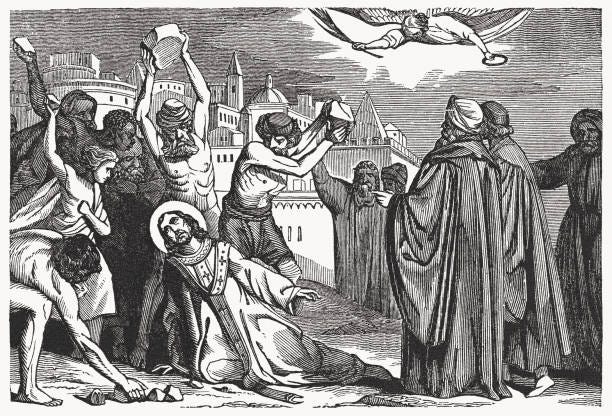The Martyr’s Witness: Stephen and the Unyielding Gospel
There are moments in Church history when a single voice, raised in truth and defiance, echoes louder than all the world’s powers combined. The story of Stephen in Acts 6–7 is one of those moments. He was not an apostle. He was not a priest. He was a deacon, appointed to serve tables. But when called upon to testify, Stephen stood boldly before the same council that condemned Christ, and he preached the gospel with such clarity and conviction that Heaven itself opened to receive him.
Stephen is the Church’s first martyr. His death was not a tragedy—it was a triumph. It was the cost of fidelity to a Risen Lord in a world that could not bear the truth. His witness remains a warning and a challenge to a Church that has grown far too comfortable with compromise.
Faithful in Service, Fearless in Speech
Stephen was appointed as one of the seven to care for the daily distribution of food to widows (Acts 6:1–6). His ministry was born out of service, not ambition. And yet, even in this humble role, Scripture says, “Stephen, full of faith and power, did great wonders and signs among the people” (Acts 6:8, NKJV).
This is the first lesson of Stephen’s life: holiness and boldness are not confined to bishops and apostles. The Spirit fills every believer who yields to Christ, and God will use those who are ready, even if their task is as ordinary as setting tables. The witness of the Church is not carried only by the pulpit—but by the lives of the faithful.
But Stephen’s faithfulness drew opposition. False accusations were raised, and he was dragged before the Sanhedrin. The charge? Speaking against the temple and the Law. The reality? Preaching Christ as the fulfillment of both.
A Sermon for the Ages
In Acts 7, Stephen delivers the longest recorded speech in Acts. It is a sweeping survey of redemptive history—from Abraham to Moses to Solomon—culminating in the charge that those who now sit in judgment of him are the true lawbreakers: “Which of the prophets did your fathers not persecute? And they killed those who foretold the coming of the Just One, of whom you now have become the betrayers and murderers.” (Acts 7:52, NKJV)
This was no soft homily. It was a prophetic indictment. Stephen did not fear the consequences because he feared God more than man. His loyalty was not to the institution of the temple, but to the Person of Christ. The leaders prided themselves on being sons of Abraham, custodians of the covenant. But Stephen unveiled their hearts—they had rejected the One to whom all the Scriptures pointed.
His sermon was saturated with Scripture, delivered without apology, and ended not with an altar call, but with his own execution.
A Vision of Glory
As the council boiled with rage and gnashed their teeth, Stephen looked up and saw something no man had ever seen: “Look! I see the heavens opened and the Son of Man standing at the right hand of God!” (Acts 7:56, NKJV)
Christ, who is usually described as seated at the right hand of the Father, is here standing. The Church Fathers and many commentators have seen this as a sign of Christ rising in honor to receive His faithful witness. Heaven stood for Stephen, even as earth condemned him.
What courage this must have given him in his final moments! The approval of men means little when the approval of Christ is seen so clearly. And the fury of the mob could not silence the voice of one who had already seen glory.
A Death That Planted Seeds
“Then they cast him out of the city and stoned him… And the witnesses laid down their clothes at the feet of a young man named Saul.” (Acts 7:58, NKJV)
That detail is not incidental. Saul—the zealous persecutor who would become Paul, the apostle—was there. He watched. He approved. And though he did not yet believe, he could not have forgotten.
Stephen’s death was not the end—it was the beginning. Tertullian would later write, “The blood of the martyrs is the seed of the Church.” Stephen’s blood watered the soil into which the gospel would soon be planted across the Gentile world.
And even in death, Stephen echoed his Lord: “Lord, do not charge them with this sin.” (Acts 7:60) As Christ forgave from the Cross, Stephen forgave from the stones. Such mercy is the mark of the Spirit.
A Church That Has Forgotten Martyrdom
In our modern age, the word “martyr” has been hollowed by misuse or dismissed as ancient history. Yet in much of the world, believers still suffer for Christ, still die for the Name. And in the West, though persecution may be more subtle, it is no less real. The temptation is to silence ourselves, to blend in, to avoid confrontation.
Stephen reminds us that the gospel is a scandal to the world. It demands repentance. It unmasks hypocrisy. And it will provoke hatred. But it also bears witness to the truth—and truth is stronger than death.
If the Church is to be faithful, it must recover this unyielding gospel. Not harshness, but holy boldness. Not arrogance, but a firm allegiance to Christ above all.
Standing with Stephen
The Church must once again raise up Stephens—men and women full of faith and the Holy Spirit, unafraid to proclaim Christ, even when the world seethes in anger. Not all will be martyred by stones, but all who live godly in Christ Jesus shall suffer persecution (2 Timothy 3:12).
And yet, we are not alone. Christ stands with us. Heaven is open. The glory that sustained Stephen sustains us. Let us then preach, pray, and live in such a way that when our time comes—whether by death or by glory—we, too, may see the Son of Man standing to receive His faithful servant.





